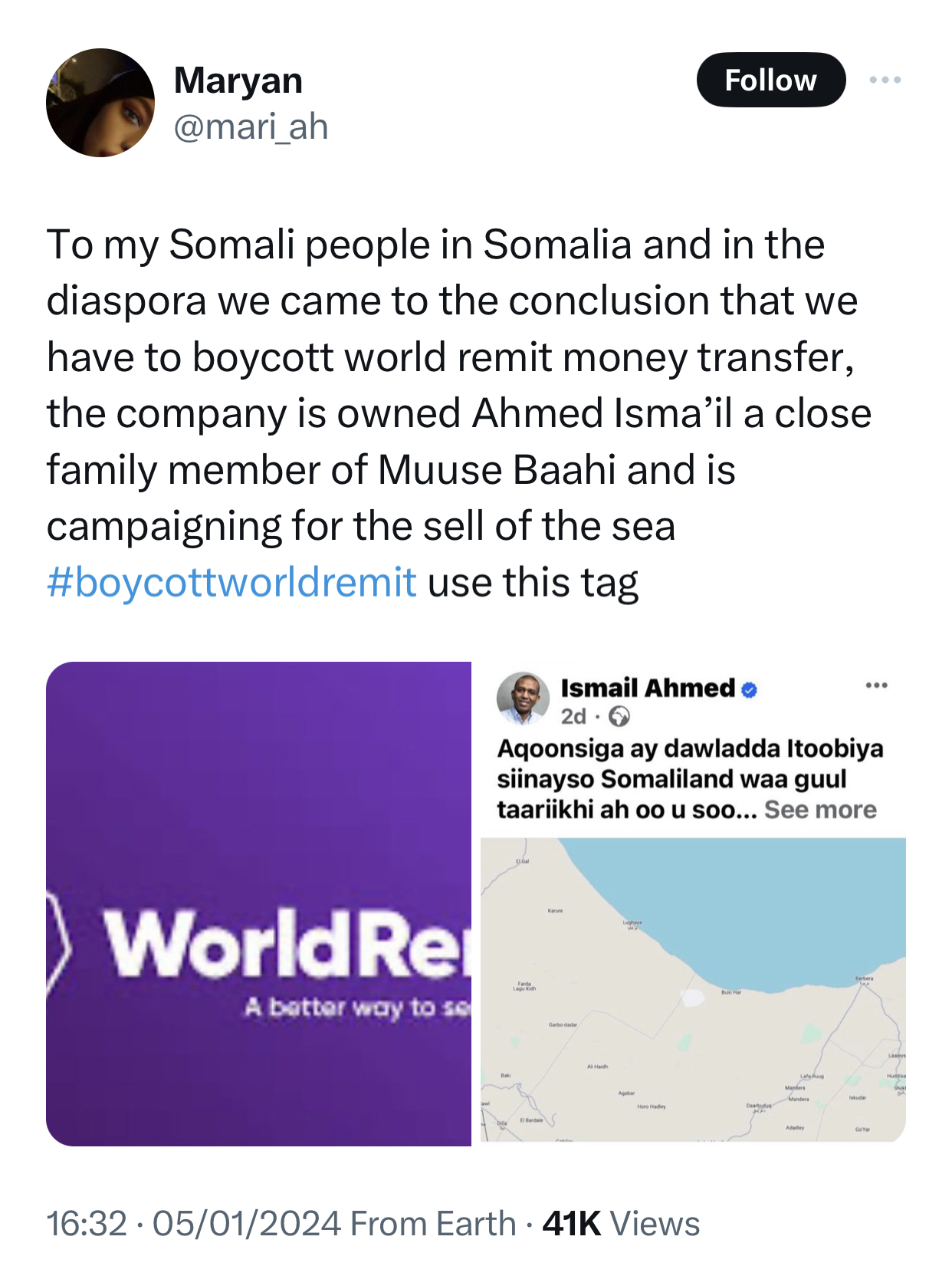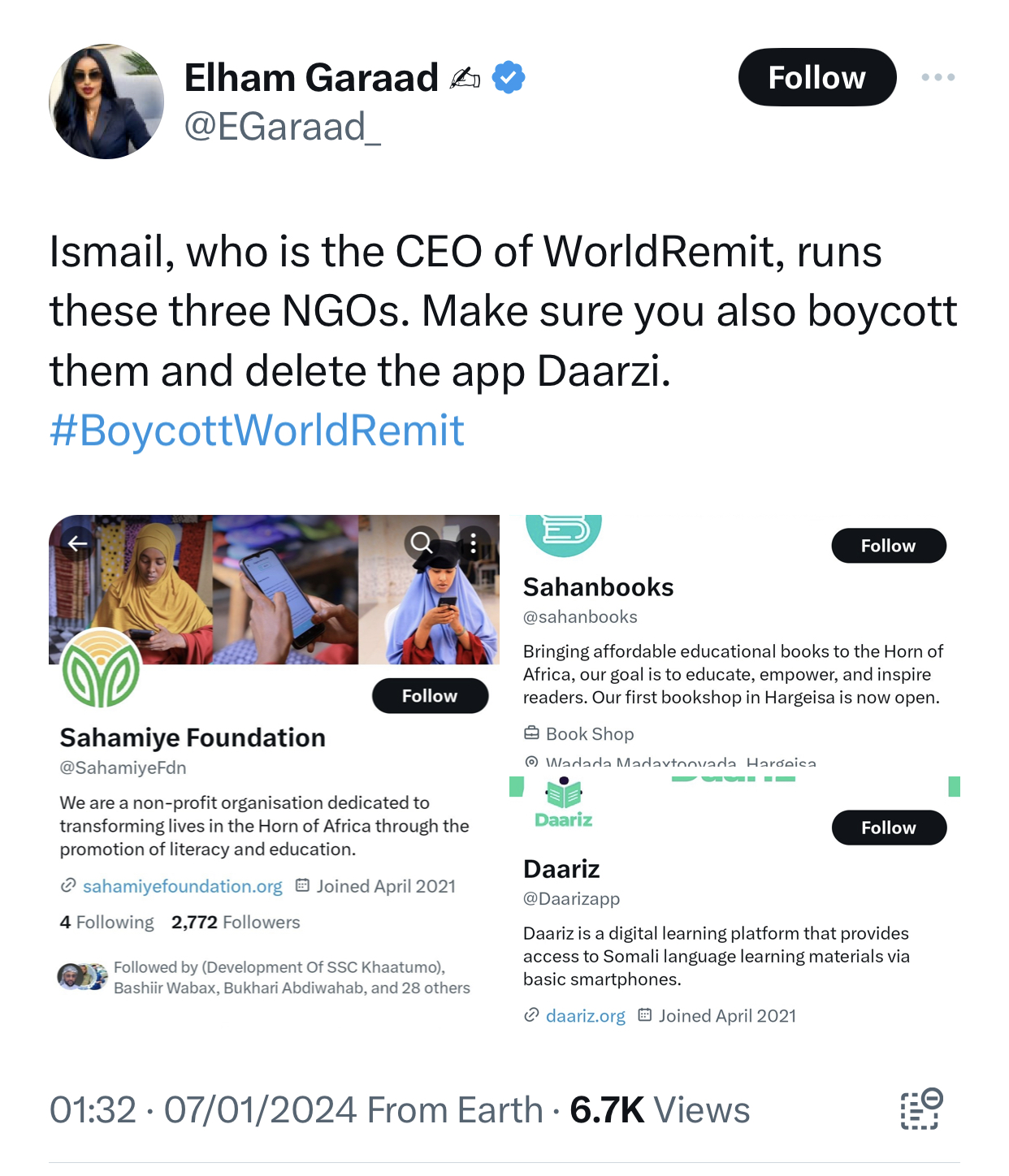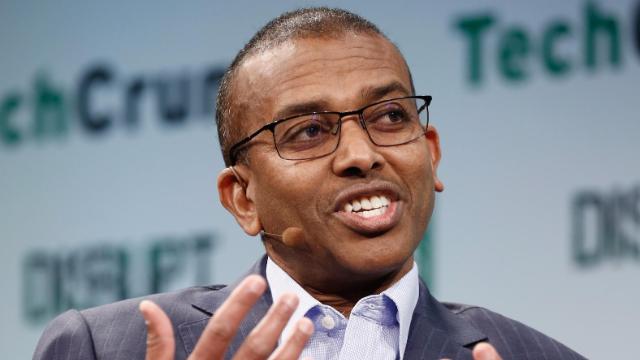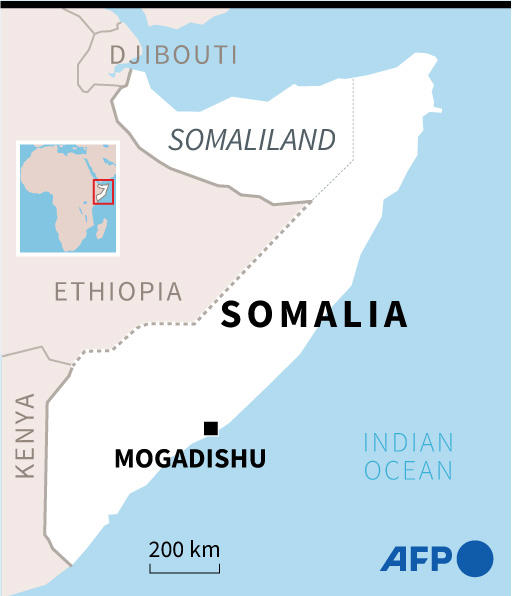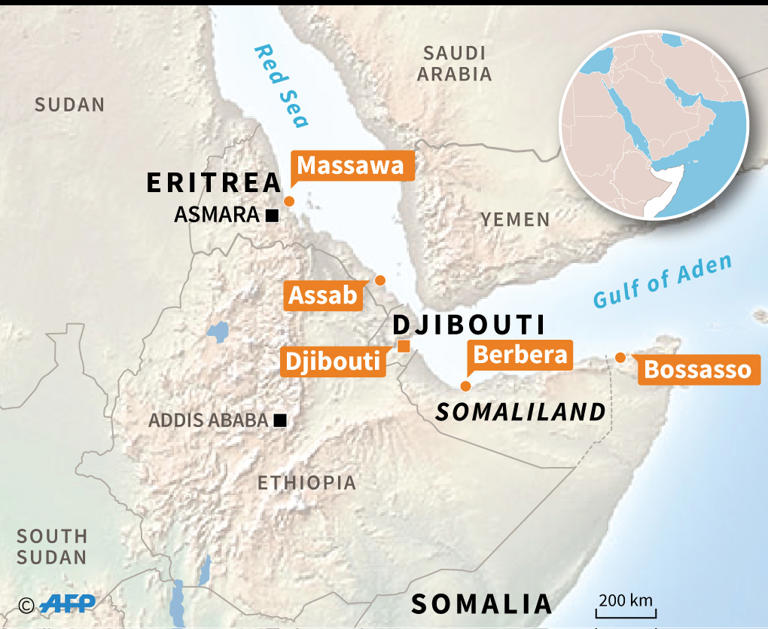Africa
WorldRemit Can Survive Without Somalia Money, Group’s Chairman Tells Off Boycott Campaigners
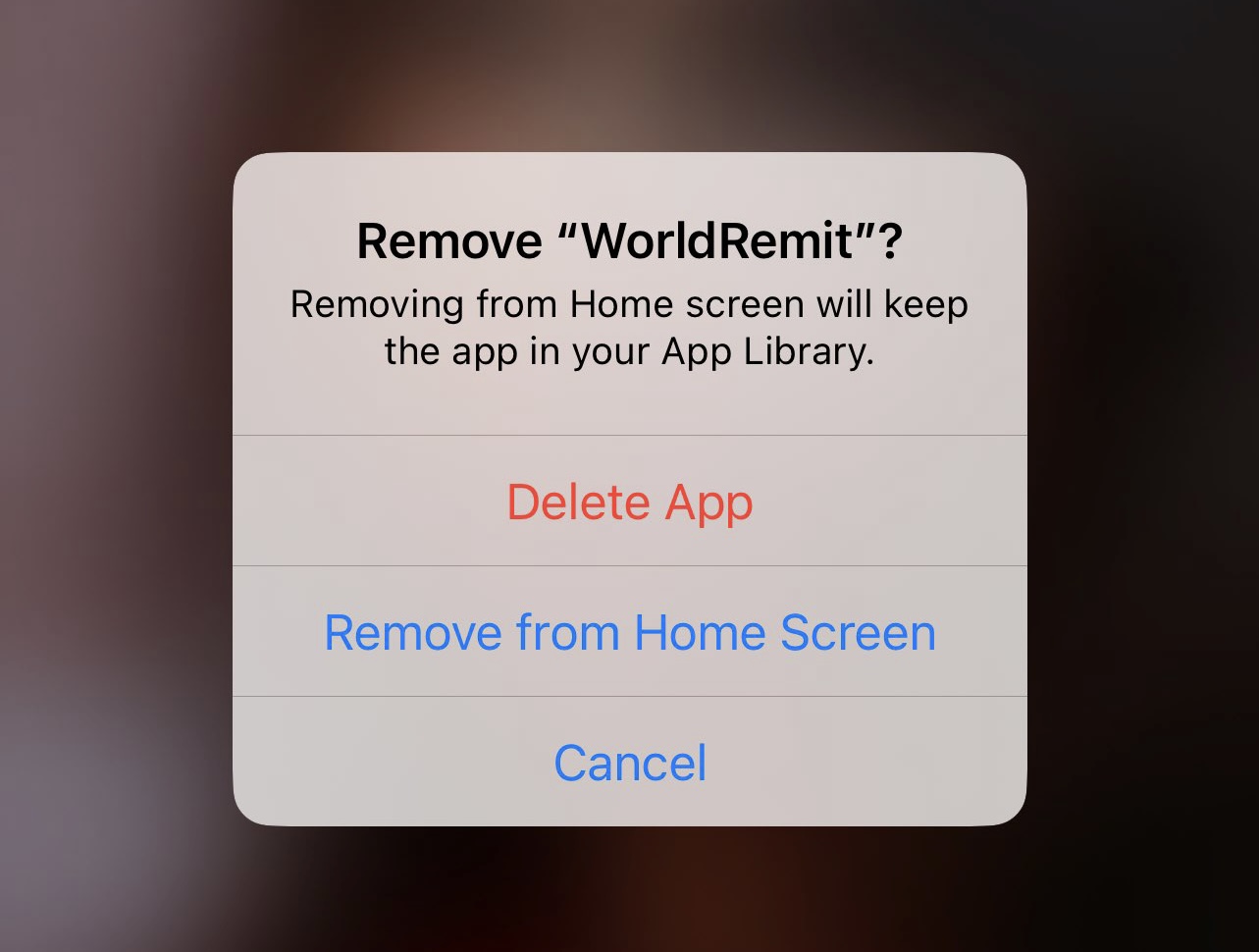
In a bombshell statement by WorldRemit CEO Ismail Ahmed he tells paid agents and trolls from Somalia “you only contribute to 0.3% of my business so boycott away.”
Over the past few days Somalia has waged a campaign against one of the most successful business men who hail from the Somaliland.
Ismail the 2020 most influential person of African heritage in the UK condemned the targeted smear campaign which he says has been orchestrated and funded by politicians in Somalia after he publicly backed the historic deal with Ethiopia.
He said that even if his entire business was funded through income from Somalia, it would not change his position on the deal.
Ismail who’s also the director of Sahamiye Foundation and and an Somalilander, voiced his opinion on this deal that didn’t go well with Somalis leading to a charged online campaign dubbed #BoycottRemit
Mr. Ismail however isn’t moved by the campaign targeting his business empire claiming the Somali make a minor market base for WorldRemit and his views cannot be changed by the campaign. He insists this is part of a wider scheme by politicians and businessmen from Somalia to vanquish Somaliland.
“As you have seen on social media, there are meetings held by big politicians and businessmen from Somalia who are determined to widen the campaign against Somaliland and the business of Somaliland. This is the aim of arresting the Somaliland businessmen to participate in spreading fake news that is wanted to be against the Somaliland people.Among the targeted companies include WorldRemit, which the group has called for a stop of its use completely.” Said Ismail in a statement.
He defiantly reiterates his stand further saying that Somalia makes a very small part of his business transactions while insinuating that a boycott wouldn’t hurt that much, “I want you to know that the money our company (WorldRemit) sends to Somalia is less than 0.3%. Even if all my business was dependent on Somalia, I would never change my views and what I see as the interests of Somaliland people.” He stamps.
Ismail had welcomed the Ethiopia-Somaliland deal saying that the recognition by the Ethiopian government to Somaliland was a historical victory that will bring to Somaliland people. “The things Somaliland and Ethiopia understood together are of special importance to Somaliland. They will lead to financial benefits, some investment and business growth that will result from the use of Ethiopia in Berbera port.” He said in part.
Ismail says that the agreement does not include the base to create a new container port which can compete with Berbera. Because, the DP World Agreement limits another similar port to be built in that area.
While addressing the fears by Somalia that Ethiopia is going to use this to strengthen their naval capabilities and pose a threat to the region, he believes otherwise, “third world countries, economically, can’t afford to make war ships equivalent to the world’s major powers. So, the fear of Navy in our provinces is not a reality.”
And even if Ethiopia was to set up a naval base, it wouldn’t be of so much threat, Ismail believes, “If not left, the security situation in the Red Sea will cause Ethiopia to need an army base to protect its commercial shipments in Djibouti. But it’s not a power that will make them attack countries or cause other problems.”
In exchange for 20 kilometre sea access for the Ethiopian naval forces, leased for a period of 50 years, Ethiopia will formally recognise the Republic of Somaliland, setting a precedent as the first nation to extend international recognition to our country.
The arrangement has angered Somalia, whose government rejected the bilateral deal and warned that it was in violation of its sovereignty.
Ethiopia, Somalia and Somaliland
Somaliland broke away from Somalia in 1991 and became a self-declared republic in 2001 following a referendum.
However, Somaliland’s statehood has not been recognised by Somalia, the United Nations or the African Union.
Both Somalia and Somaliland share a border with landlocked Ethiopia and have ports on the Red Sea.
However, the claim that Ethiopia now owns Somaliland’s port is misleading.
Port access agreement
The Ethiopian government has been pressing neighbouring countries for negotiated access to the Red Sea.
On January 1, 2024, Prime Minister Abiy Ahmed signed an agreement with Somaliland’s leader Muse Bihi Abdi in Addis Ababa allowing Ethiopia to use the breakaway territory’s port in Berbera.
Abiy’s office released a statement saying that “the Memorandum of Understanding shall pave the way to realise the aspiration of Ethiopia to secure access to the sea”.
According to Ethiopia’s National Security Adviser Redwan Hussien, the MoU allows Ethiopia to establish commercial maritime operations in the region by leasing a military base in Berbera on the southern coast of the Gulf of Aden, at the gateway to the Red Sea and further north to the Suez canal.
Kenya Insights allows guest blogging, if you want to be published on Kenya’s most authoritative and accurate blog, have an expose, news TIPS, story angles, human interest stories, drop us an email on [email protected] or via Telegram
-

 Grapevine1 week ago
Grapevine1 week agoAlleged Male Lover Claims His Life Is in Danger, Leaks Screenshots and Private Videos Linking SportPesa CEO Ronald Karauri
-

 Lifestyle2 weeks ago
Lifestyle2 weeks agoThe General’s Fall: From Barracks To Bankruptcy As Illness Ravages Karangi’s Memory And Empire
-

 Grapevine5 days ago
Grapevine5 days agoRussian Man’s Secret Sex Recordings Ignite Fury as Questions Mount Over Consent and Easy Pick-Ups in Nairobi
-

 Investigations3 days ago
Investigations3 days agoMulti-Million Dollar Fraud: Three Kenyans Face US Extradition in Massive Cybercrime Conspiracy
-

 Investigations2 weeks ago
Investigations2 weeks agoEpstein’s Girlfriend Ghislaine Maxwell Frequently Visited Kenya As Files Reveal Local Secret Links With The Underage Sex Trafficking Ring
-

 News2 weeks ago
News2 weeks agoState Agency Exposes Five Top Names Linked To Poor Building Approvals In Nairobi, Recommends Dismissal After City Hall Probe
-

 Economy2 days ago
Economy2 days agoIran Demands Arrest, Prosecution Of Kenya’s Cup of Joe Director Director Over Sh2.6 Billion Tea Fraud
-

 Business1 week ago
Business1 week agoM-Gas Pursues Carbon Credit Billions as Koko Networks Wreckage Exposes Market’s Dark Underbelly

